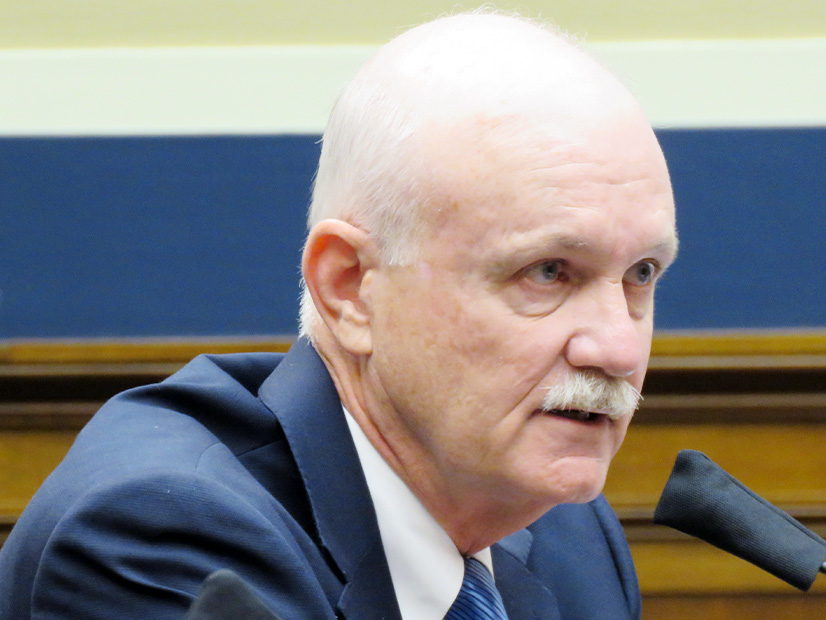The surest way to ensure that transmission is not expanded is to usurp states’ authority, FERC Commissioner Mark Christie said April 4 at WIRES’ Spring Member Meeting in Chicago.
With the Infrastructure Investment and Jobs Act, Congress directed FERC and the Department of Energy to update their processes on designating National Interest Electric Transmission Corridors (NIETCs) after a federal court curtailed the commission’s backstop siting authority from the Energy Policy Act of 2005. A NIETC designation allows the commission to overrule states that reject lines proposed in the specified area.
The commission will implement that law because it is a creature of statute, Christie said. But he predicted the changes would have little practical effect. (See DOE Lays out Plans for Designating Transmission Corridors.)
“The backstop siting authority will last until the point when FERC actually imposes a backstop siting authority on a state that just had a proceeding and found that it was not needed,” Christie said. “That’s as long as it’s going to last because the political blowback is going to be off the charts.”
While he was on Virginia’s State Corporation Commission, Christie voted to approve more than 100 certificates for transmission lines, from small “wreck and rebuild” lines to the Trans-Allegheny Interstate Line (TrAIL) project, which was the longest regional project built in PJM. That project went through three states, including high-value real estate in Virginia’s Horse Country, where owners did not want it to spoil views of their “10,000-acre” estates, Christie said.
The opposition was well funded and vociferous, but the line was needed to maintain reliability, he said.
“And because of the process that we followed and giving the public the opportunity to come in front of their own state body, I think that played a big part in why Virginia politicians didn’t come out in opposition to it,” Christie said.
If FERC were to overrule a state’s rejection of such a project, all its senior politicians, including its congressional delegation, would oppose it.
“You cannot get stuff built without state buy-in,” Christie said.
Christie extended the same basic argument to the commission’s Notice of Proposed Rulemaking on transmission planning, the final rule of which FERC could vote on in the coming months.
“There’s a lot of people running around Congress, ghostwriting letters for congressmen to send to us saying, ‘Well, don’t let the state stand in the way,’” Christie said. “You know, don’t let the states be an obstacle. FERC should just do it. FERC should just impose the cost allocation.”
He recalled that two of the early, important cases he sat on during his SCC tenure were Dominion Resources’ and American Electric Power’s requests to join PJM.
“We approved them because we thought regional planning could give us, occasionally, a regional reliability project that would be more efficient than a local project if the facts were there,” Christie said. “And we were willing to let PJM plan those regional projects, but they’re reliability projects.”
The facts are easy to prove for reliability projects, he said; the same can be said for economic projects that make sense as long the benefits outweigh the costs. However, the NOPR (and Order 1000 before it) contemplates a third category: public policy. That is where Christie has some concerns.
“A public policy project is planned by politicians; [it is] fundamentally different,” Christie said.
They work in single-state markets, but in RTOs, with multiple states that often have divergent policies, they can lead to problems.
“If politicians in one state want 100% green energy, that’s fine,” Christie said. “If they want to pay for it. If they’re willing to accept the reliability consequences. That’s fine. But don’t make consumers in another state pay for it, unless they agree.”
It does not make sense to throw those three categories into a regulatory blender and allocate every type of line across an entire RTO footprint, he added.
“Even a policy project has reliability benefits,” Christie said. “Well, tangentially it may. You can build a line almost anywhere and get some congestion relief. That doesn’t mean it’s the optimal solution.”
The way to build transmission projects is to have states buy into them, even when they are incredibly controversial like TrAIL, which is on the same scale of transmission that the NOPR’s supporters most want to see get built. Getting FERC to impose cost allocation on the states if they cannot independently come to an agreement will not work, Christie said.
“I think that’s a pipe dream,” he added. “I think that’s just totally unrealistic the way things work in America.”




